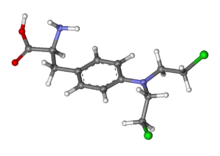|
Melfalan
Melfalan

|

|
|
|
| Klinički podaci
|
| Robne marke
|
Alkeran, L-PAM, L-Phenylalanine mustard, L-Sarcolysin
|
| AHFS/Drugs.com
|
Monografija
|
| Identifikatori
|
| CAS broj
|
148-82-3
|
| ATC kod
|
L01AA03
|
| PubChem[1][2]
|
4053
|
| DrugBank
|
DB01042
|
| ChemSpider[3]
|
405297
|
| ChEBI
|
CHEBI:28876  Y Y
|
| ChEMBL[4]
|
CHEMBL852  Y Y
|
| Hemijski podaci
|
| Formula
|
C13H18Cl2N2O2
|
| Mol. masa
|
305,200
|
| SMILES
|
eMolekuli & PubHem
|
| InChI |
|---|
InChI=1S/C13H18Cl2N2O2/c14-5-7-17(8-6-15)11-3-1-10(2-4-11)9-12(16)13(18)19/h1-4,12H,5-9,16H2,(H,18,19)/t12-/m0/s1
Key: SGDBTWWWUNNDEQ-LBPRGKRZSA-N  Y Y |
|
| Fizički podaci
|
| Tačka topljenja
|
182.5 °C (361 °F)
|
| Farmakokinetički podaci
|
| Poluvreme eliminacije
|
1,5 h
|
| Farmakoinformacioni podaci
|
| Trudnoća
|
?
|
| Pravni status
|
|
| Način primene
|
Oralno
|
Melfalan je organsko jedinjenje, koje sadrži 13 atoma ugljenika i ima molekulsku masu od 305,200 Da.[5][6][7][8][9]
Osobine
Reference
- ↑ Li Q, Cheng T, Wang Y, Bryant SH (2010). „PubChem as a public resource for drug discovery.”. Drug Discov Today 15 (23-24): 1052-7. DOI:10.1016/j.drudis.2010.10.003. PMID 20970519. edit
- ↑ Evan E. Bolton, Yanli Wang, Paul A. Thiessen, Stephen H. Bryant (2008). „Chapter 12 PubChem: Integrated Platform of Small Molecules and Biological Activities”. Annual Reports in Computational Chemistry 4: 217-241. DOI:10.1016/S1574-1400(08)00012-1.
- ↑ Hettne KM, Williams AJ, van Mulligen EM, Kleinjans J, Tkachenko V, Kors JA. (2010). „Automatic vs. manual curation of a multi-source chemical dictionary: the impact on text mining”. J Cheminform 2 (1): 3. DOI:10.1186/1758-2946-2-3. PMID 20331846. edit
- ↑ Gaulton A, Bellis LJ, Bento AP, Chambers J, Davies M, Hersey A, Light Y, McGlinchey S, Michalovich D, Al-Lazikani B, Overington JP. (2012). „ChEMBL: a large-scale bioactivity database for drug discovery”. Nucleic Acids Res 40 (Database issue): D1100-7. DOI:10.1093/nar/gkr777. PMID 21948594. edit
- ↑ Loeber R, Michaelson E, Fang Q, Campbell C, Pegg AE, Tretyakova N: Cross-linking of the DNA repair protein Omicron6-alkylguanine DNA alkyltransferase to DNA in the presence of antitumor nitrogen mustards. Chem Res Toxicol. 2008 Apr;21(4):787-95. Epub 2008 Feb 14. PMID 18324787
- ↑ Souliotis VL, Dimopoulos MA, Episkopou HG, Kyrtopoulos SA, Sfikakis PP: Preferential in vivo DNA repair of melphalan-induced damage in human genes is greatly affected by the local chromatin structure. DNA Repair (Amst). 2006 Aug 13;5(8):972-85. Epub 2006 Jun 15. PMID 16781199
- ↑ Moscow JA, Swanson CA, Cowan KH: Decreased melphalan accumulation in a human breast cancer cell line selected for resistance to melphalan. Br J Cancer. 1993 Oct;68(4):732-7. PMID 8398701
- ↑ Knox C, Law V, Jewison T, Liu P, Ly S, Frolkis A, Pon A, Banco K, Mak C, Neveu V, Djoumbou Y, Eisner R, Guo AC, Wishart DS (2011). „DrugBank 3.0: a comprehensive resource for omics research on drugs”. Nucleic Acids Res. 39 (Database issue): D1035-41. DOI:10.1093/nar/gkq1126. PMC 3013709. PMID 21059682.
- ↑ David S. Wishart, Craig Knox, An Chi Guo, Dean Cheng, Savita Shrivastava, Dan Tzur, Bijaya Gautam, and Murtaza Hassanali (2008). „DrugBank: a knowledgebase for drugs, drug actions and drug targets”. Nucleic Acids Res 36 (Database issue): D901-6. DOI:10.1093/nar/gkm958. PMC 2238889. PMID 18048412.
- ↑ Ghose, A.K., Viswanadhan V.N., and Wendoloski, J.J. (1998). „Prediction of Hydrophobic (Lipophilic) Properties of Small Organic Molecules Using Fragment Methods: An Analysis of AlogP and CLogP Methods”. J. Phys. Chem. A 102: 3762-3772. DOI:10.1021/jp980230o.
- ↑ Tetko IV, Tanchuk VY, Kasheva TN, Villa AE. (2001). „Estimation of Aqueous Solubility of Chemical Compounds Using E-State Indices”. Chem Inf. Comput. Sci. 41: 1488-1493. DOI:10.1021/ci000392t. PMID 11749573.
- ↑ Ertl P., Rohde B., Selzer P. (2000). „Fast calculation of molecular polar surface area as a sum of fragment based contributions and its application to the prediction of drug transport properties”. J. Med. Chem. 43: 3714-3717. DOI:10.1021/jm000942e. PMID 11020286.
Literatura
Vanjske veze
|
|